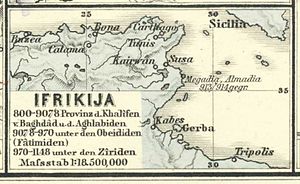Ifriqiya
Ifrīqiya (Arabic إفريقية) or Ifrīqiyā (Arabic إفريقيا) is the medieval Arabic name for the territories of Tunisia, eastern Algeria and Tripolitania. It thus encompasses the same area as the Roman province of Africa, from which the name Ifrīqiya is also derived.
The Maghreb lying to the west of it was called al-maghrib al-awsat ("central west," roughly Algeria) and al-maghrib al-aqsa ("far west," present-day Morocco). In modern Arabic, Ifrīqiya refers to the entire continent of Africa.
The country was subdued in protracted battles between 663 and 703 by the Muslim Arabs under Uqba ibn Nafi, Hassan ibn al-Numan and Musa ibn Nusayr. Especially the united Berber tribes under Kusaila ibn Lemzem and the al-Kahina put up fierce resistance. Even after the subjugation, the country did not calm down, as uprisings of the Kharijites and others broke out under Abu l-Chattab al-Maafiri. Only after the suppression of the uprising of the Malzūza-Berber under Abū Ḥātim al-Malzūzī did the situation in the province calm down towards the end of the 8th century.
During and shortly after the Muslim conquest of North Africa, the entire Maghreb and also Andalusia were ruled by the governor in Ifrīqiya, who in turn was subordinate to the governor of Egypt until 705. The chief town of the region was at first Kairuan, and from the 10th century al-Mahdiya, which was succeeded by Tunis in the 13th century. Under Muslim rule, the country experienced an economic and cultural boom. Ifrīqiya became the starting point for the extensive Arabization of the Berber tribes of the Maghreb.
Because of Ifrīqiya's great distance from the center of the empire in Iraq, the governors of the Muhallabites already gained extensive independence from the Abbasids. After the fall of the Abbasids, the Aghlabids (800-909) were forced to take over around 800. Until the 16th century, the Fatimids (909-973), the Zirids (973-1152), the Almohads (1152-1229) and the Hafsids (1229-1574) followed, before the Ottomans were able to assert their supremacy and Tunisia received its present borders.
Rifa'a at-Tahtawi assumed in the mid-19th century that Ifrīqiya was the origin of the name Africa, which "the Franks" - as he calls the Europeans - gave to the entire continent.

Ifrīkija in a map from 1877
See also
- Islamic expansion
- History Tunisia
- History of Algeria
Notes
- ↑ Rifāʿa al-Ţahṭāwī: Ein Muslim entdeckt Europa, die Reise eines Ägypters im 19. Jahrhundert nach Paris (original title: Taḫlīṣ al-ibrīz fī talḫīṣ Bārīber), translated, edited and commented by Karl Stowasser. Gustav Kiepenheuer, Leipzig and Weimar 1988, p. 23. Further edition: Beck, Munich 1989.
Search within the encyclopedia